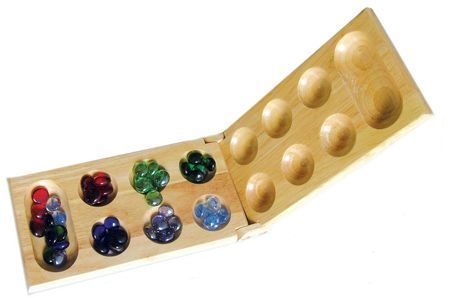Mangala Board Game
Mangala is a traditional two-player abstract strategy board game that has been played for centuries in various cultures around the world. The game is also known by other names such as Mancala, Oware, and Kalah. The objective of the game is to capture more seeds or stones from your opponent’s side of the board.
Game Components of Mangala Board Game
How To Setup Mangala Board Game
To set up Mangala, place the board between the two players. Each player has six pits in front of them, with a larger store (mancala) to the right. Fill each of the six pits with four seeds or stones, leaving the stores empty.
Gameplay Mechanics and Game Objective
– A player selects a pit on their side containing seeds and distributes them one by one into subsequent pits in a counter-clockwise direction.
– If the last seed lands in the player’s store, they get an additional turn.
– If the last seed lands in an empty pit on the player’s side, they capture all seeds in the opposing pit and add them to their store along with the last seed.
Player Experience
Mangala is a game that combines simple rules with deep strategic play. Players need to think critically about each move to maximize their chances of capturing more seeds. The game is relatively quick, lasting around 5-10 minutes, making it accessible for both casual and serious gamers.
Pros
Cons
Personal Thoughts on Mangala Board Game
Mangala is ideal for players who enjoy strategic games that require thinking ahead. It is a great choice for families, as it helps develop counting and strategic thinking skills. However, it may not be as engaging for those who prefer games with elements of chance or randomness. Overall, Mangala offers a fun and intellectually stimulating experience that connects players to a rich historical and cultural context.
We are supported by our audience. When you purchase through links on our site, we may earn an affiliate commission, at no extra cost for you. Learn more.

